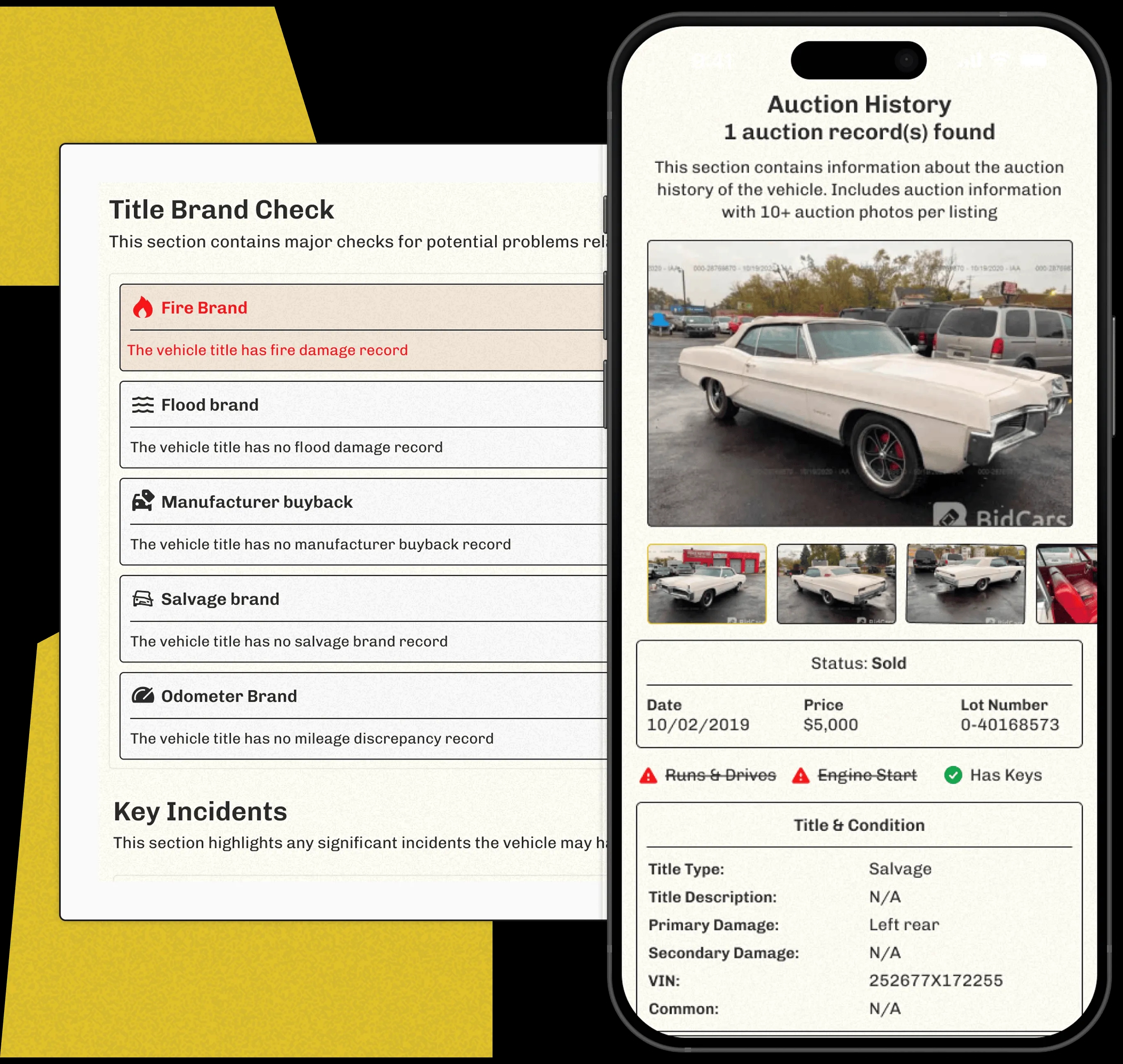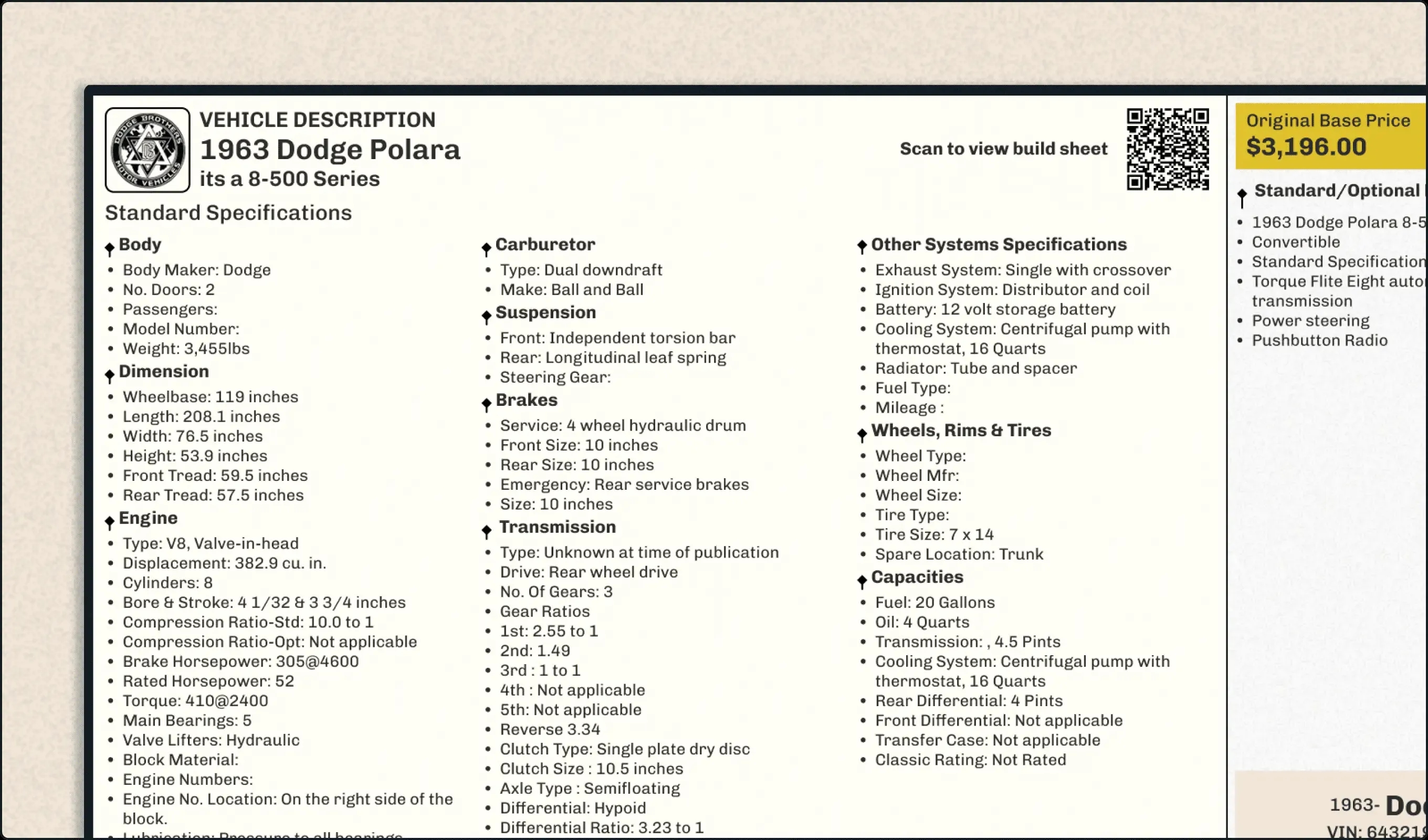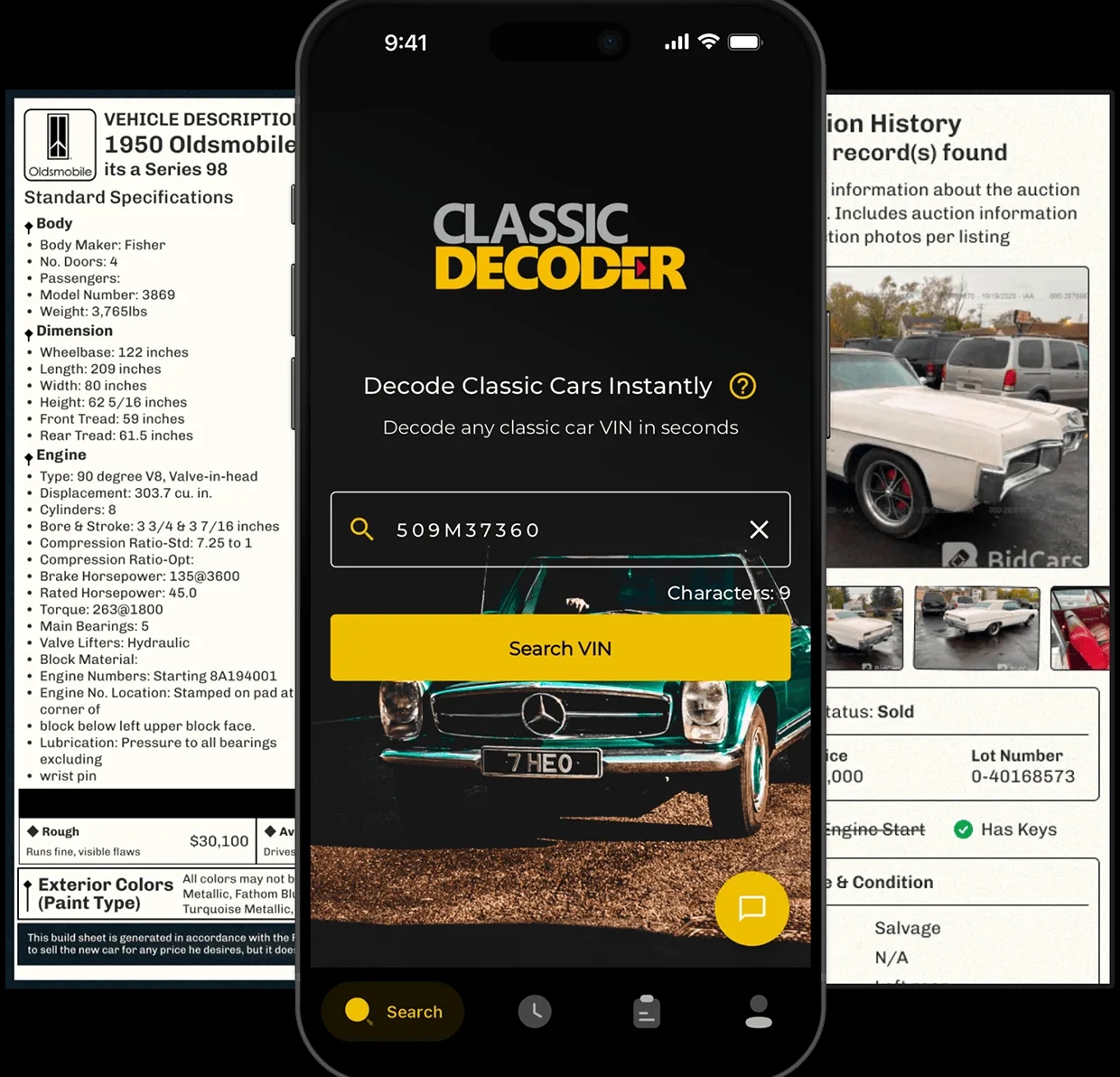1959 Pontiac Bonneville
The '59 Pontiac Bonneville: a big, bold beauty! A classic muscle car precursor, it showed off fins galore and represented post-war optimism. Its powerful engine and sleek design made it a head-turner, solidifying its place in automotive history and pop culture. Think iconic American style.
Decode Classic VINs to Get Vehicle History Report and Build Sheet
Discover the 1959 Pontiac Bonneville: A Classic Icon in Automotive History
The 1959 Pontiac Bonneville is more than just a classic car; it's a cultural symbol and a piece of automotive history. It blends the aesthetics of the late '50s with performance capabilities that made it stand out in its time. But what really makes the Bonneville special? Is it the celebrities who owned it or the roaring engine that defined its era?

1959 Pontiac Bonneville Models:
Select the vehicle's model to see the correct data for it.
How Much is Pontiac Bonneville Worth?
Original MSRP :$3,175.00
Outstanding
Clean
Average
Rough
1959 Pontiac Bonneville Specs
Interested in buying a classic car or selling one?
Access detailed history reports for classic vehicles from hundreds of manufacturers.
- Accident Records
- Theft Records
- Loan & Lien Information
- Auction Information
- Salvage Information and more

History of 1959 Pontiac Bonneville
The journey of the 1959 Pontiac Bonneville began in a period of change and innovation. The model was developed under the vision of Dave Mitchell and designer John Folden, reflecting the cultural and technological shifts of its time. This car was designed not just to function, but to make a statement. Its development spanned several years, filled with design and engineering tweaks that aimed to capture the spirit of a bolder, more performance-driven automotive industry.
Specifications You Didn't Know About
Underneath its elegant exterior, the Bonneville featured some serious machinery. The supercharged 3800 engine and Tri-Power induction system were not just about speed—they were about character and ambition. This powerhouse spoke to an age when cars were symbols of freedom and boundless potential.
Learn more about a classic car: Get Build Sheet by VIN.
Access reproduced classic build sheets to learn more about your classic vehicle details.
- Standard Specifications
- Original Base Price
- Standard & Optional Equipment
- Exterior & Interior Colors
- VIN ID & Location description

Famous Figures Who Own the 1959 Pontiac Bonneville
Tom Cruise
You can't talk about the Bonneville without mentioning Tom Cruise. Yes, the same guy who raced jets in "Top Gun" appreciates the classic allure of this car. Cruise's affinity for speed and style finds a perfect match in the 1959 Bonneville, cementing its status as a vehicle made of stories and stardust.
Chris Evans
Who would've thought the man who played Captain America also cruised around in such a symbol of Americana? Chris Evans is another celebrity who chose the Bonneville, aligning his preference for classic, timeless elegance with his public image.
Steve Coogan
On the other side of the pond, Steve Coogan's ownership further showcases the Bonneville's transatlantic appeal. While Coogan's humor is distinctly British, his choice in cars speaks a universal language of style and class.
James Mason
And let's not forget the legendary actor James Mason. His ownership of a Bonneville only further underscores the car's presence amongst Hollywood royalty.
A Cultural Icon
Back in the day, the Bonneville wasn't just a mode of transport but a canvas of individual expression. Its "Wide Track" design was not only an engineering feature but also a bold styling statement. The car appeared in popular films and TV series like "American Graffiti" and "Happy Days," solidifying its place in pop culture.
For those interested in understanding how can tell more about this rich legacy, a detailed report could reveal intriguing tidbits about past owners and the car's journey over the decades.
1959 Pontiac Bonneville Gallery




Fun Facts About the 1959 Pontiac Bonneville
Pop Culture Star: It wasn't just a background piece; the Bonneville played roles in movies that defined decades.
Record Setter: It was the official pace car at the inaugural Daytona 500. Talk about starting strong!
High Value: The car has fetched over $100,000 in auctions, showcasing its enduring appeal.
Interested in Buying or Selling a Classic Car?
Knowing the full story is essential. You wouldn't buy a house without seeing blueprints. The same goes for classic cars. Here are some key things to look for:
Accident Records
Theft Records
Loan & Lien Information
Auction Information
Salvage Information and more
Check out details—much like a blueprint for your dream ride. can further ensure the car you're eyeing has a clear and fascinating history. Also, how about using a for older models?
In the end, the 1959 Pontiac Bonneville isn't just a car; it's a chapter in the book of American history waiting to be driven and explored. Whether you're an enthusiast or a potential new owner, the Bonneville offers stories of the past worth cruising again and again.
Classic VIN Decoder App |Now available on both Android and iOS!
At Classic Decoder, we believe that developing a mobile app is a great way to extend our classic car data solution hub to as many users as possible across the globe. Our app is built with users and precision in mind. It holds the key to unlocking the history and details of any retro car at your fingertips. It also comes with fascinating and user-friendly features that make it stand out from other mobile apps designed for this purpose.
The Classic Decoder app lets you decode and lookup any classic VIN in a flash. Access accurate vehicle information and history, make an informed decision faster, and buy and trade in classic cars with confidence.

Download The Classic Decoder App now.
Some unique features include:
- Support all classic VIN lengths from 5 to 13 digits
- Support classic cars produced from 1910 – 1980
- Online Garage features – to add and manage your vehicles
- 24/7 Customer Support
- Easy onboarding for first-time users
Explore Pontiac Bonneville from Other Years
Frequently Asked Questions
The '59 Bonneville? Man, that's a beauty! It's instantly recognizable, you know? Think sleek, sweeping lines; a long, low profile that's just classic. Key features include its distinctive tailfins – seriously impressive, they are – and the prominent, almost aggressive, front grille. The overall design is incredibly stylish, even by today's standards; it's a head-turner, no doubt about it. Oh, and let's not forget those cool, iconic headlights. They're a dead giveaway!
Under the hood, you had a couple of choices; it wasn't a huge selection, but still impressive for the time. Most Bonnevilles sported the 389 cubic inch V8; a real powerhouse for its day. It packed a serious punch! Some, however, came with a more powerful, even wilder 421 cubic inch V8 – now that's a beast. Think of it like this: the 389 was a strong workhorse, while the 421 was like a thoroughbred racehorse – capable of incredible speed. But both are seriously cool pieces of automotive history.
Pontiac offered a couple of transmission choices back then, pretty standard for that era, actually. You could get it with a three-speed manual; a true driver's car kind of setup. But, a lot of people, especially back then, opted for the two-speed automatic – the Powerglide was pretty popular. It was smoother and easier to drive in city traffic, let's be honest. So you had a choice based on how much you liked rowing your own gears.
Precise production figures are sometimes tricky to nail down for classic cars. But, generally speaking, it wasn't a huge production run compared to some other models, which makes it somewhat of a rare find now. Somewhere in the ballpark of 8,000-10,000 is a reasonable estimate, give or take a few; that's just a guesstimate, of course. It adds to their desirability amongst collectors, naturally.
The value varies wildly depending on the condition, originality, and options of a specific car. Let’s be honest; a pristine, numbers-matching, concours-ready Bonneville will fetch a significantly higher price than a project car, or something with major rust. It's like buying a house, right? Location, location, location. And with these beauties, condition is absolutely crucial. You're looking at a range from tens of thousands to potentially six figures (or more!), so it's really tough to give a hard number. Do your homework!
Like any classic car, there are potential pitfalls to watch out for. The electrical system, for instance; sometimes that can be a real headache. Things like wiring and the generator can get a little grumpy with age. The braking system, too, should be thoroughly inspected by a mechanic specializing in classic cars. You don’t want any surprises there! Also, keep an eye out for rust, of course, particularly in the body's lower sections. It's a common problem with these older cars. A thorough inspection from a qualified mechanic is highly recommended before you even think about buying one.

